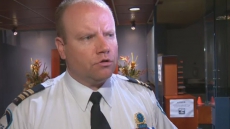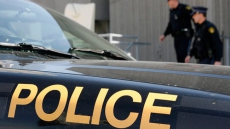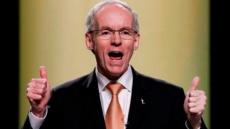OTTAWA — It could very well be that 2014 is remembered as the year when Canada traded one shadow war for possibly two others.
The flag was barely folded and put away in Kabul, marking a formal end to more than 12 years of counter-insurgency war against the ghostly Taliban, before CF-18s were dispatched to begin pounding extremist targets in Iraq.
The summer offensive by the Islamic State of Iraq and the Levant, the al-Qaida splinter group that brought its brutal caliphate to the gates of Baghdad, coincided with the under-cutting of Ukraine.
The so-called "little green men" — Russian troops stripped of identifiable badges fighting in Crimea and eastern Ukraine while Vladimir Putin's government denied their presence — competed for the world's attention alongside black-masked, knife-wielding Islamic State warriors, many of them brutal, bloodthirsty mercenaries who encouraged Muslim faithful to rise up and slaughter westerners in their own backyards.
Both of them struck from the shadows with inscrutable motives and a fury that sowed a mixture of horror, indignation and confusion.
It was brought home for Canadians in a brutal, bloody manner with the Oct. 22 attack on Parliament and the murders of two Canadian soldiers. The would-be jihadists had tenuous links to ISIL, but the group was quick to claim them as their own — and the Harper government was equally ready to make the link.
In a year-end interview with The Canadian Press, NATO's supreme commander suggested the world has become a less stable, potentially more dangerous place, especially considering Russia is a nuclear power.
Some have suggested the world is on the verge of a new Cold War.
The Islamic State, with its lurid Internet beheadings and tales of medieval-mindset massacres, represents a different, potential long-term threat, one that is the West is struggling to wrap its head around.
"Until we address the root causes of the Islamic State, its going to be hard to win this battle with the Islamic State," said U.S. Gen. Phillip Breedlove, whose remarks carry the faint echo of Liberal Leader Justin Trudeau's oft-maligned position.
"We put great pressure on this kind of issue in Afghanistan and you saw it moved to the Maghreb (northern Africa) and the eastern part of Africa. This is an adaptive long-term problem until we get to the root causes and address those issues."
It is the standoff with a now economically battered Russia that mostly preoccupies the 59-year-old career U.S. Air Force commander.
"If we can clearly no longer count on Russia as a partner, and we face an issue there that is unresolvable, this is existential because of the types of weapons Russia holds," Breedlove said in a telephone interview from Brussels.
His comments are relatively tame when held up against those from government and academic circles in Poland and the Baltic states, where there is a collective belief that Putin's long-term goal is to destroy the credibility of NATO by demonstrating it will not use force, regardless of the provocation.
The sentiment is reinforced by Russian parliamentarians such as Vyacheslav Nikonov, who was ominously quoted by The Financial Times last October as suggesting the crisis over Ukraine "is the most dangerous moment in relations between the Russia and the West since the Cuban missile crisis," the 1962 showdown between Washington and Moscow that brought the world to the brink of nuclear war.
Defence analyst George Petrolekas, a retired colonel, mused recently that the Saudi Arabian-induced tanking of world oil prices has done more to check Russian ambitions than anything the West, particularly NATO, has come up with since the Ukrainian crisis began to unfold last winter.
Canada's operations commander, Lt.-Gen. Jonathan Vance, said the reality of 21st century conflict is that much happens outside the military sphere.
The challenge, especially with Russia, is make to sure that the economic perils of low oil and sanctions don't create massive instability and lead to an even more dangerous brinkmanship, he said.
"What we've seen in the response by Canada and its NATO allies is a measured response to what Russia is doing," Vance said.
"It's safe to say it's rarely useful to further destabilize a situation. Our doctrine, our approach, has generally been to recover a situation. Wider and worse destabilization is absolutely not in the best interests of anybody, least of which is Canada."
Eastern Europe may be the focus of Breedlove's attention, but Canada's participation in the coalition air campaign against ISIL fills Vance's schedule. That will continue in the new year as the Harper government decides whether to extend the six month CF-18 combat mission, due to expire in April.
"ISIL is being contained, as we said we would at the coalition level; (and) degraded to a certain degree," said Vance.
U.S. commanders have warned the campaign to defeat the extremist threat, using Iraqi ground forces and Syrian resistance fighters, could take up to three years. The next campaign phase, likely to involve training of Iraqi forces, will unfold in the new year.
Breedlove said NATO has not yet received a request from the Iraqi government to conduct a training mission, but he understands one could be coming.
Canada, with its contingent of special forces with the Kurds in Irbil, is already engaged in training, Vance argues.
At the outset of the Ukraine crisis, the Harper government was quick to dispatch CF-18s to take part in air policing missions over the Baltic states, keeping Russians away from the tiny nations. It rerouted HMCS Toronto to join NATO's standing task force, which cruised the Black Sea off Ukraine and has sent a handful of troops to land exercises.
It has, however, remained on the periphery of long-term plans and commitments, especially those that cost money.
"I'm certainly not going spend on a massive military expansion for the sake of doing so," Harper said at the conclusion of the Wales Summit in September.
"As I say, our allies can be assured and are assured that Canada will spend what is necessary."





